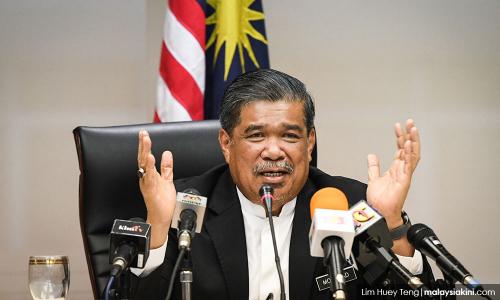'Presence of big powers challenging maritime landscape in South China sea'
The growing presence of big powers in the South China Sea has contributed to a challenging maritime landscape which could immensely affect the region, said Defence Minister Mohamad Sabu today.
He said Malaysia affirmed South China Sea must remain free, open and commercially navigable without any concern of militarisation or hostility.
“Malaysia stands firm with its Asean colleagues to fully and effectively implement the Declaration on the Conduct of Parties in the South China Sea including through confidence-building measures, initiatives and a common code of conduct in the maritime space to promote peace and stability,” Mohamad (above) said at the 13th Asean Defence Ministers' Meeting (ADMM) Retreat in Bangkok today.
The retreat was chaired by Thai Deputy Prime Minister Prawit Wongsuwan, who is in charge of security affairs in the kingdom.
In August, China’s Foreign Minister Wang Yi said Asean and Beijing had completed the first reading of the single draft negotiating text for the code of conduct (COC). Wang said it is an important progress in the COC talks which marks a critical step towards the goal of concluding the consultations within three years.
Meanwhile, Mohamad also raised Malaysia’s concern on the Rohingya crisis in Rakhine State.
He said Myanmar should address the Rohingya crisis judiciously to avoid more displaced persons fleeing to neighbouring countries, including Malaysia and it could affect the security of the region.
“The increasing vulnerable situation of Rohingyas in Myanmar and Bangladesh will cause them (Rohingyas) to be susceptible to extremist ideologies and recruitment. They have the potential impact on security and stability in the region,” he said.
Meanwhile, Mohamad also commended Myanmar for taking steps in engaging Asean Coordinating Centre for Humanitarian Assistance on Disaster Management (AHA Centre) to access recruitment for safe and dignify repatriation process of displaced persons.
“Malaysia believes the potential areas of collaboration identified by AHA Centre can be further supported by Asean and Plus countries,” he said.
Meanwhile, Mohamad said the trafficking of drugs, arms and people, piracy, sea robbery and kidnapping for ransom which are illegal, unreported and unregulated (IUU), are often associated with transnational crimes which continue to be a concern to Malaysia.
On counter-terrorism, he said Malaysia applauded Indonesia’s effort in initiating the Asean “Our Eye Initiative,” an information-sharing platform for member countries to facilitate the exchange of intelligence on terrorism, radicalism and violent extremism.
“The initiative is timely for Asean member countries to counter-terrorism as well as non-traditional security challenges which have become a growing concern in the region,” he said.
- Bernama
RM12.50 / month
- Unlimited access to award-winning journalism
- Comment and share your opinions on all our articles
- Gift interesting stories to your friends
- Tax deductable

